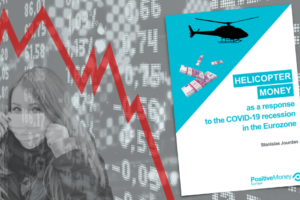REPORT: Helicopter money as a response to Coronavirus crisis

The Coronavirus crisis offers ideal conditions and strong justifications for the implementation of helicopter money by the European Central Bank. My latest report for Positive Money Europe outlines how to move this idea from theory to practice.
This report was written in the context of my former role as Executive Director at Positive Money Europe.
While many people are losing their jobs and their incomes, as a result of the lockdown measures taken by governments, proposals for “helicopter money” or universal basic income are increasingly being discussed globally. The White House is already planning to send checks to all American households, and calls for “emergency basic income” are also attracting significant support from citizens.
In this context of the Coronavirus crisis, the case for the ECB to deploy helicopter money has never been more relevant, and the political conditions are also extremely favorable. While summarizing the economic justifications for doing helicopter money during the post-Covid19 recovery phase, the added value of this report is to outline political pathways for implementing it.
The report was already featured in prominent European media outlets including La Tribune and Handelsblatt.
Key points from the report:
- The EU’s economic response to the Covid-19 crisis focuses so far on reducing the damage. While necessary, these measures alone will not provide the unprecedented stimulus needed to kickstart the recovery after the public health crisis has been overcome;
- In the current Eurozone macroeconomic and institutional framework, transfers to all citizens financed by the ECB would be the most effective and quick means of stimulating the economy;
- Helicopter money would work by boosting consumption, preventing the accumulation of private arrears and non-performing loans debts, while limiting the additional public debt burden that would otherwise be incurred by the crisis;
- Combined with other social transfers by national social security agencies, helicopter money would contribute to filling the gaps in the national welfare systems which the Coronavirus crisis has revealed, thus protecting the most vulnerable people;
- A transfer of EUR 1000 to all Eurozone citizens would provide an immediate boost of at least 1.2% of GDP, without accounting for positive spillover effects and fiscal multipliers;
- The ECB should pre-announce helicopter money as soon as possible, but only trigger the payments in the economic recovery phase. In the meantime, banks should be obliged to offer free-of-charge overdrafts to all customers, to the equivalent amount of the future ECB transfers;
- While the EU Treaties would in principle permit the unilateral and autonomous implementation of helicopter money by the ECB, we argue that a politically coordinated approach with EU institutions and member states would greatly facilitate the deployment and effectiveness of the policy.
Suggested citation
Jourdan, S. (2020) Helicopter money as a response to the Covid19 pandemic crisis. Positive Money Europe. Available at: https://www.positivemoney.eu/wp-content/uploads/2020/03/Helicopter_Money_Covid.pdf
This post is also available in: French
